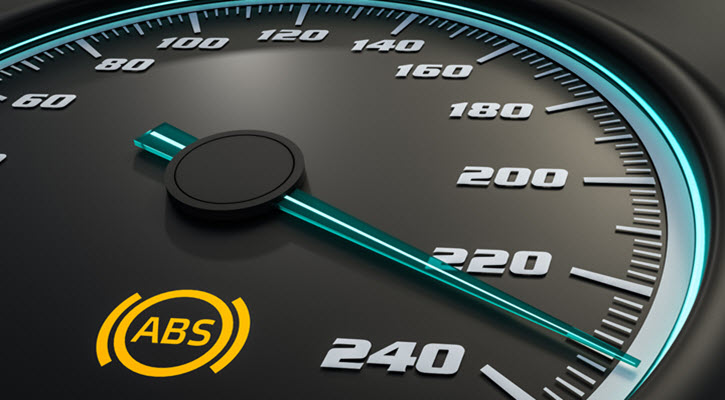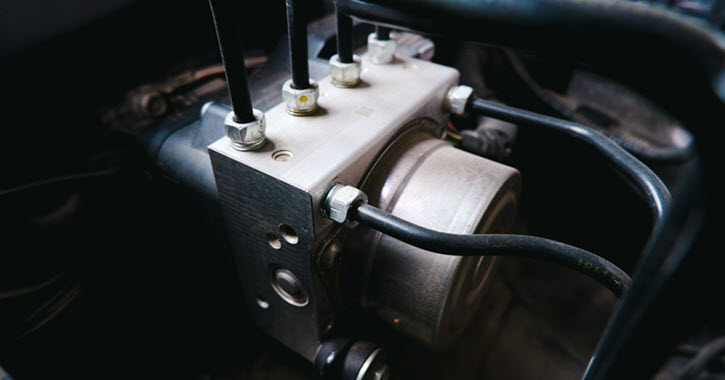
for Audi, BMW, Land Rover, Jaguar, Mercedes,
Mini, Porsche & Volkswagen Repair

for Audi, BMW, Land Rover, Jaguar, Mercedes,
Mini, Porsche & Volkswagen Repair

Ever found yourself in a situation where you had to slam on the brakes so hard that you felt a rapid pulsation under your foot? That is your BMW’s ABS system at work. Continue reading to learn what this BMW system is and how it can save you on the road.
The Anti-lock Braking System (ABS) is your BMW’s built-in guardian angel for those moments when stopping quickly is crucial. It’s a sophisticated safety feature designed to prevent the wheels from locking up during intense braking scenarios. Imagine you’re driving and suddenly need to stop to avoid a hazard. Without ABS, slamming on the brakes could lock up the wheels, causing the tires to skid, and you’d lose control over steering.
Here’s where ABS shines. It steps in like a quick-thinking co-pilot, pulsating the brakes faster than the blink of an eye. This rapid pulsation allows the wheels to continue rolling slightly even as you brake hard, which means you can still steer where you need to go. It’s your BMW’s way of clutching onto the road, ensuring you can dodge obstacles without losing control. Essentially, ABS keeps a bad situation from turning worse, making it a critical feature for enhancing safety on the road.
Each wheel in your BMW is equipped with a sensor that monitors its speed. During hard braking, these sensors are on high alert for any sudden deceleration that signals a wheel is about to lock up. Upon detecting such a scenario, these sensors instantly relay the information to the ABS control module – the brain behind the operation.
This control module quickly springs into action by adjusting the braking force. It modulates the brakes by applying and releasing pressure several times a second to prevent lock-up. This ensures that each wheel maintains enough traction to keep rolling. It is as if your BMW has its own set of reflexes, ready to respond in a split second to keep the wheels turning just enough so you can steer safely through a potential mishap.
Wheel speed sensors are pivotal to the ABS function, monitoring the rotational speed of each wheel and sending this data to the ABS control module. If a sensor becomes faulty or damaged, it can send incorrect signals, leading to ABS malfunction. Causes of sensor failure include dirt accumulation, damage from road debris, or wear over time.
The ABS module is essentially the brain of the system. It processes information sent to it by the sensors and uses that information to decide when and how to modulate the brake pressure. If the module experiences electrical failure, corrosion, or software issues, it can directly affect how the ABS performs.
The brake system is a hydraulic system, meaning it uses fluid to apply pressure to the brakes. Brake fluid is essential to keep the brakes working properly, so if the fluid levels get too low, your brakes and ABS system might not work well.
The ABS system is electronically controlled, and like any electronic system, it relies on fuses to protect against voltage spikes. A blown fuse can cut off power to the ABS module, resulting in system failure. This is often one of the first things checked during troubleshooting as it’s an easy fix.
Wiring harnesses, connectors, and other electrical components can suffer from wear, corrosion, or damage. These issues can disrupt the electrical signals necessary for ABS operation, leading to malfunctions.

At European Service Center, we are dedicated to ensuring our customers are as safe as possible in their BMWs, so that means we are well-versed in diagnosing and repairing ABS issues. We serve drivers in and around Alpharetta, Chamblee, Cumming, Norcross, Dunwoody, Buckhead, Roswell, Atlanta, GA; Houston, and Dallas, TX.
We employ only the best mechanics, who are not only experienced in working on BMWs but also passionate about them. To make sure your BMW is being serviced by the best, give us a call or stop by today to learn more about how we can help.